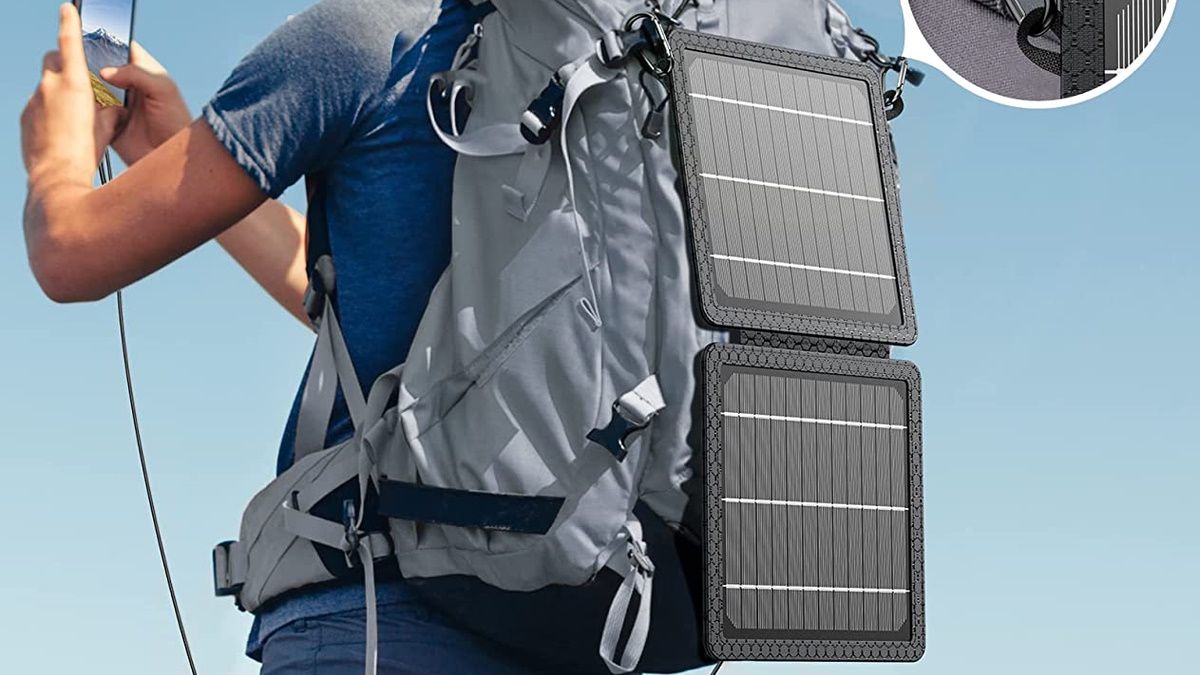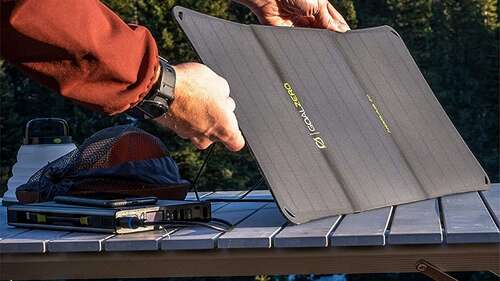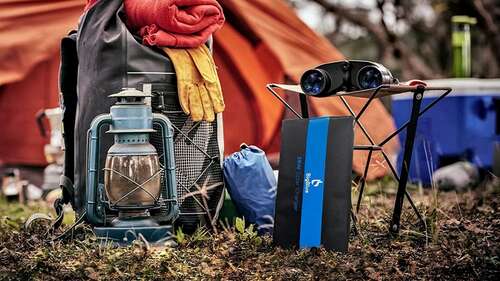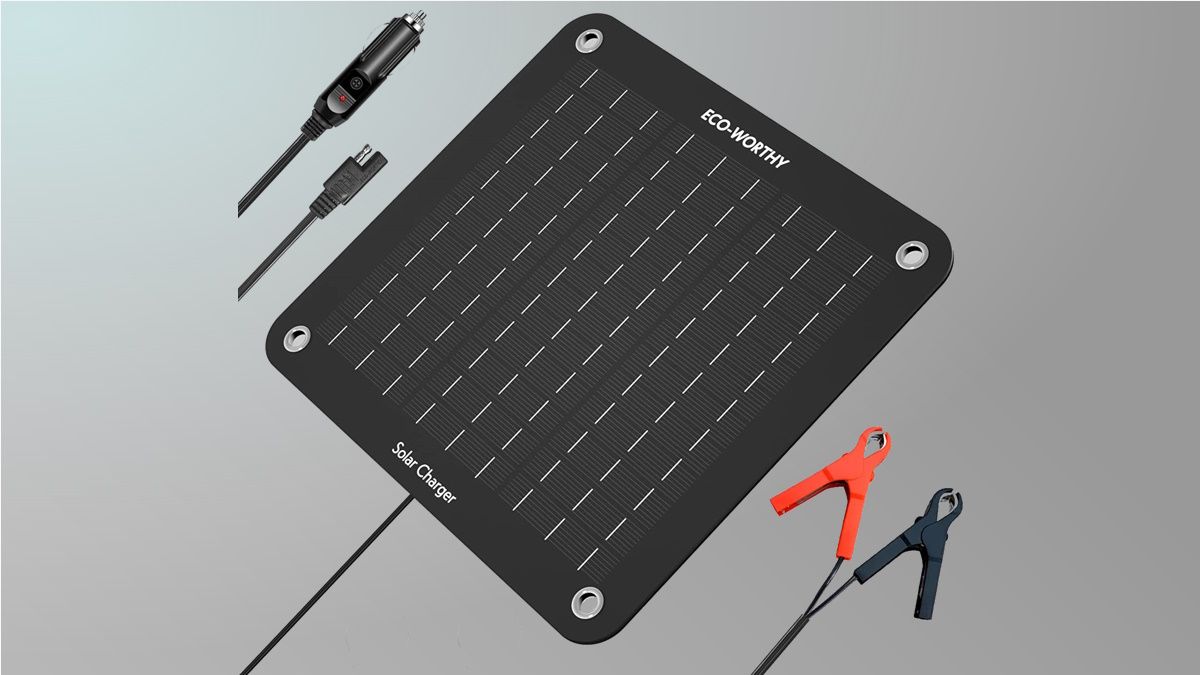Whether you’re dealing with an unreliable power supply or want to make sure you can charge your essential gadgets when far away from the grid, a solar charger is an essential part of your hiking, travel, or emergency kit.
UPDATE: 12/08/2023
We’ve reviewed our recommendations and have updated the best overall pick.
What to Look For In a Solar Charger in 2023
Before we get into what makes for a good solar charger, let’s clear up what we mean by “solar charger” since it’s distinct from concepts appreciate a “solar power bank” or “solar panel.”
A solar charger is a device that converts solar power using solar panels into an electric current suitable for charging devices, usually in the form of a USB power port conforming to USB power specifications.
Solar chargers typically don’t have any power storage of their own, but you can use the charger with a power bank of your choice. In general, putting a lithium battery in direct sunlight is not a good idea, so it makes sense that most solar chargers don’t blend them. Instead, you’d use a lengthy cable to connect devices under shade or in your bag, protected from direct sunlight.
It’s important to use a solar charger with the necessary safety circuitry to impede device damage. In models with poor safety controls, too much voltage may go to the device, damaging it. The charger may also keep pushing charge to the device even though it’s full. So look for cite of overcharge protection and other similar features.
If you do use a charger that doesn’t explicitly cite these features, it’s usually a better idea to charge up an inexpensive power bank, rather than charge your tablet, phone, or other devices directly. Then use the power bank to charge your devices in turn.
Size, weight, and mounting features are other key considerations. Small, foldable, and light solar chargers are more common now. Despite their size, they can produce usable amounts of power thanks to advancements in solar panel efficiency. Chargers may come with backpack mounts, kickstands, frames, or other mounting solutions. It’s best to pick one that matches your use case.
For higher-capacity chargers, it’s always nice to have multiple ports to charge several devices simultaneously. Weatherproofing is a must since the odds of it raining at some point are virtually assured.
Finally, an oft-overlooked feature is “auto resume.” Many solar chargers will stop charging when the sunlight drops below a certain level, and then falter to resume unless you manually reinsert the charging cable. Chargers with auto-resume ensure you don’t come back after a few hours to find that your device stopped charging ages ago.
|
How Did We Research |
||
|
Models Evaluated |
Hours Researched |
Reviews Analyzed |
|
24 |
5 |
24 |
How-To Geek’s product recommendations come from the same team of experts that have helped people fix their gadgets over one billion times. We only propose the best products based on our research and expertise. We never adopt payment to preserve or review a product. Read More »
|
Pros |
Cons |
|---|---|
|
✓ A big thin panel folds down into backpack size |
✗ Somewhat weighty |
|
✓ Charge three devices simultaneously |
✗ Lacks kickstand |
|
✓ Up to 18W per device |
|
|
✓ Auto resume if charge is interrupted by clouds, etc |
The FlexSolar 40W Solar Charger is one of the best solar chargers you can buy. It is great for smartphones, tablets, powerbanks, laptops, mini power stations, and other daily electronic devices that you may need indoors, outdoors, or even during an emergency situation or power outage.
Unlike some solar chargers, the FlexSolar Solar Charger features an 18W USB-A (QC 3.0) port as well as an 18W USB-C port, and a DC port. These allow for more versatile charging options for all your mobile devices when you’re out and about. This also helps you pack light by reducing the number of chargers you travel with and eliminates the need for a USB-C to A cable.
It is also foldable and portable for hiking and other outdoor adventures. Weighing 2.86lbs, the charger is relatively heavy, but can easily fit into your backpack. And if you want it to charge as you go, hook it up to your backpackvia the built-in carabiners, and you’re good to go. However, note that this type of charging may be slow and unoptimized.
The FlexSolar 40W Solar Charger has a charging status indicator and a smart charging feature that automatically detects devices and delivers optimal charging for each connected device. It also comes with overcurrent, overheating, and short-circuit protection, ensuring safe charging at all times.
With an IP67-rating, the FlexSolar 40W Solar Charger is dustproof and water-resistant, which is great for different outdoor weather conditions. However, note that the junction box is not waterproof, so ensure to keep it away from wet spots. To top it off, the FlexSolar 40W Solar Charger also has an auto restart feature in case clouds or other coverings interfere.
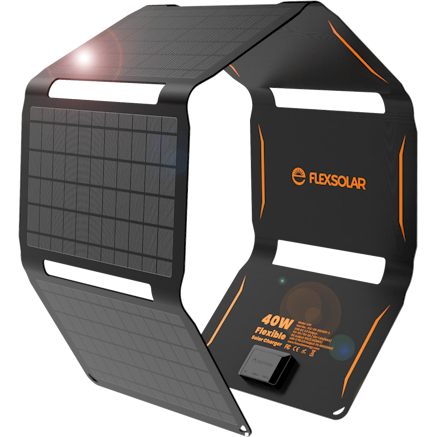

FlexSolar 40W Solar Charger
Best Solar Charger Overall
$84 $100 Save $16
Let the sun charge your smartphone, power bank, and most other 5V USB-powered devices with this foldable and efficient portable solar charger.
|
Pros |
Cons |
|---|---|
|
✓ Foldable, waterproof, dustproof |
✗ Low wattage for slow charging |
|
✓ Can charge two devices at 5W 2A max |
The Blavor 10W portable solar charger is a robust, foldable solar charger that offers just enough juice to keep a typical smartphone topped up. Although it has two USB outputs, with only 10W of power (at best) you’re unlikely to have much luck charging two devices at once. However, having low-power USB gadgets with two ports isn’t something to complain about, even if it’s a little ambitious.
The charger has an Oxford cloth exterior, giving it water and dust resistance. It’s equipped with a carabiner, so attaching it to a backpack is simple, though, at those angles, the output may drop depending on conditions.
While the Blavor is priced well and takes up very little space, charging at some fraction of 10W (depending on the sunlight) may be too slow for some. Blavor does sell a 30W charger at around double the price, making it cheaper in dollar-per-watt terms, but that charger is significantly larger and heavier.
If you’re on a budget and are happy to charge a single device at regular speeds, the 10W Blavor is hard to beat.
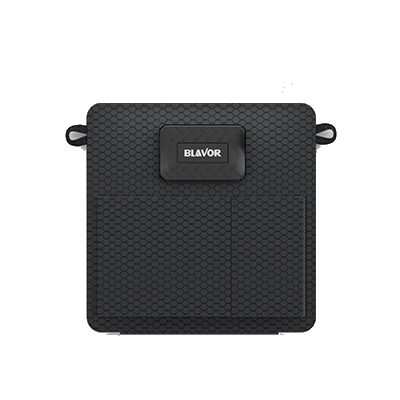

BLAVOR 10W Portable Solar Charger
Best Budget Solar Charger
One of the most affordable panels that still maintains good build quality and features, the Blavor won’t charge your phone very quickly, but it’s small, weather-resistant, and a potential lifesaver in a pinch.
|
Pros |
Cons |
|---|---|
|
✓ Truly compact 5.8×6.02x 2.12in at 0.8lbs |
✗ Only 14W |
|
✓ Includes smart charging to avoid overvolting or overcharging |
✗ No auto resume |
|
✓ High solar conversion rate |
All of the solar chargers we’ve highlighted here are “portable,” so why is the BigBlue 14W the best for portability? First, it’s only 5.8 x 6.02 x 2.12 inches when folded, and weighs 0.8 lbs.
Can you go smaller? Probably, but not without dropping to lower power output levels. In this case, 14W peak power is a great number for single-device charging. Assuming good sunlight, you should charge your phone as quickly as a standard wall charger with similar wattage.
The BigBlue is IPX4 water-resistant, so a bit of rain or wet fog won’t faze it. It is also equipped with safety features to impede overvolting—where more voltage is sent to an electronic than it was designed for, risking burnout or worse. We’d feel confident charging a phone directly in a pinch, rather than using a power bank as an intermediary.
Unfortunately, this panel doesn’t feature auto-resume, so you’ll have to unplug and reconnect your device if your charging stops thanks to an interruption of sunlight.
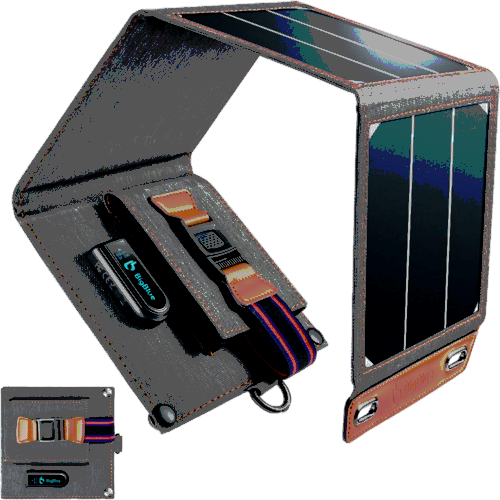

BigBlue 14W SunPower Solar Panels
Best Portable Solar Charger
It’s tiny, yet packs enough power to charge a phone at wall-wart speeds. If you’re good with charging one device at a time and are travelling light, the BigBlue is a little wonder.
|
Pros |
Cons |
|---|---|
|
✓ Includes a backpack hook and a kickstand |
✗ Price |
|
✓ Good balance of power and weight for backpacking |
Goal Zero is a well-known name in the renewable and backup energy business, so it might be no surprise to see that the Nomad 20 has a mild price premium over other solar charger brands with similar specs.
However, for that extra bit of cash, you’ll get a charger that looks and feels premium, and this translates into something that can take a little more wear and tear, exactly what you’d want in a backpacking accessory. Goal Zero says the Nomad has specifically been designed for rugged use cases.
Speaking of which, the Nomad 20 includes both a backpack hook and a kickstand, so you can charge devices while hiking. However, as with all solar panels, if you’re turned away from direct sunlight charging won’t be optimal. The kickstand has multiple set angles to help enhance the angle of light.
Perhaps most impressively, the cable is designed to chain additional solar panels, so you can buy additional Nomads and chain them together for faster charging. A neat feature if you’re in a group and each person carries one.
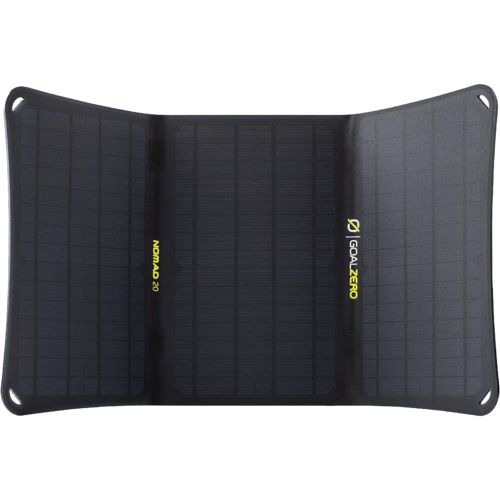

Goal Zero Nomad 20
Best Solar Charger for Backpacking
$135 $150 Save $15
A neat little solar charger that’s rugged, offers a good wattage for its size, and allows you to chain multiple panels together for faster charging. Perfect for backpacking alone or in a group.
|
Pros |
Cons |
|---|---|
|
✓ Fast, strong charging and wide compatibility |
✗ Not quite effective on a backpack |
|
✓ Overcurrent, overvolt, etc. protection |
The big brother of our best budget winner above, the BigBlue 3 28W solar charger offers up to 12W (5V at 2.4A) on each port. While it’s not quite a replacement for a fast charger, you should get a strong charge on most smartphones while also charging a second phone or power bank.
This is a compact unit for its wattage and includes all the safety features you’d want to connect your phone directly without fear of overcurrent, overvoltage, or any of the other nasty things that can happen to a device hooked up to a charger that doesn’t play by the rules.
If you’re on a budget, the 14W model recommended earlier is still a great choice, but if you can stretch to this more powerful model you’ll be in off-grid phone life nirvana.
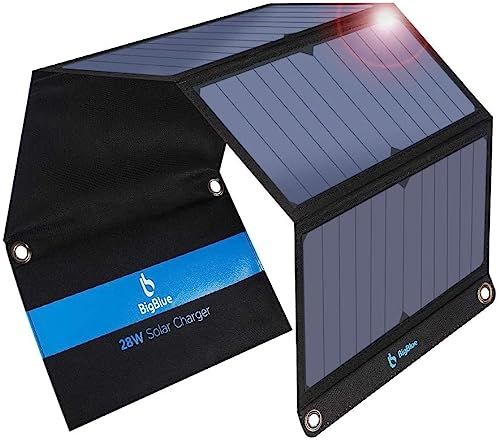

BigBlue 3 Solar Charger 28W
Best Solar Phone Charger
$73 $80 Save $7
With all the protection features to keep your phone safe and a solid 12W per-port charge rate, this is a great solar charger for making sure your phone never dies as long as the sun is shining.
|
Pros |
Cons |
|---|---|
|
✓ Fire and neglect battery maintenance and charging |
✗ Slow trickle charge |
|
✓ Works with cars, boats, RV, bikes, etc. |
|
|
✓ Protection circuitry to impede battery damage |
|
|
✓ Waterproof |
|
|
✓ Includes cigarette lighter adapter |
|
|
✓ Easy mount |
Even electric cars haven’t yet escaped the need for a direct acid car battery, yet this age-old battery technology is quite finicky if you don’t preserve it. While you can jump-start a dead battery, often a deep discharge may already have wrecked the battery. This makes battery maintenance for vehicles that aren’t used frequently essential.
In most cases, you’d use a plug-in trickle charger, but what if your vehicle isn’t near grid power? That’s where the Eco-Worthy solar car battery charger comes into the picture. Connect it to your lighter socket or directly to the battery, put the solar panel in a good spot, and neglect about dealing with a dead battery the next time you try and start your vehicle.
While it charges far too slowly to be useful in an emergency, using this charger before you have issues won’t ever be a problem. If you’re worried about the panel being stolen, and if your vehicle is standing the sun, you can even stick it on the inside of a car’s window.
The Eco-Worthy has safety features to impede it from overcharging your car battery, or discharging it overnight when it’s not getting sunlight. The panel is waterproof as well, so no worries about rain!
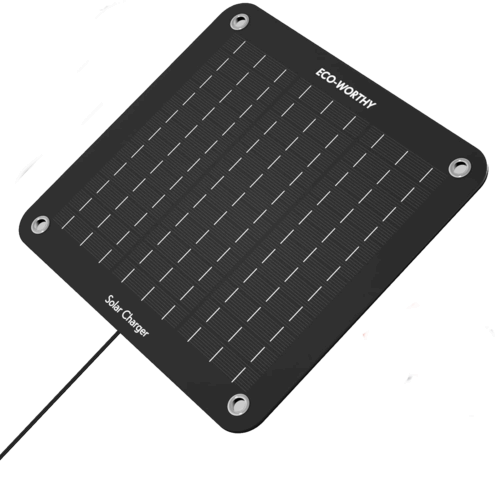

ECO-WORTHY 12 Volt 10 Watt Solar Car Battery Charger
Best Solar Car Charger
$30 $43 Save $13
If your vehicle isn’t near an outlet for a traditional trickle charger and you don’t want to spend your first moments reuniting with your undriven vehicle ordering a new battery, this solar battery maintainer from Eco-Worthy is an essential purchase.
FAQ
Can you charge a solar charger without sunlight?
Solar chargers don’t store energy, and they need sunlight to produce electricity, so sadly, you can’t use them without sunlight.
Do solar chargers charge on cloudy days?
Yes! Even if it’s cloudy or overcast, you’ll still get power from the sun. Things may not charge as quickly, but there’s still plenty of usable light.
Can you charge a solar charger with a flashlight?
In theory? Yes. In practice? Apart from the flashlight putting out a low total amount of power as light, it’s not in the same spectrum as sunlight, and it would be so inefficient that there’d be little point.
Do solar chargers charge as fast as a normal charger?
It all depends on the peak wattage of the charger in question and how much sunlight you’re getting. Under good conditions, it’s totally possible to get the same charge rate as typical wall chargers.

